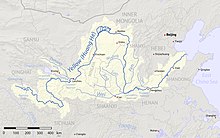Ordos Loop
| Ordos | |||||||||

The course of the Yellow River
|
|||||||||
| Chinese name | |||||||||
|---|---|---|---|---|---|---|---|---|---|
| Traditional Chinese | |||||||||
| Simplified Chinese | |||||||||
|
|||||||||
| Mongolian name | |||||||||
| Mongolian |
ᠣᠷᠳᠣᠰ Ordos |
||||||||
| Transcriptions | |
|---|---|
| Standard Mandarin | |
| Hanyu Pinyin | Èěrduōsī |
| Wade–Giles | Ê4-êrh3-to1-ssŭ1 |
The Ordos Loop is a large rectangular bend of the Yellow River in central China. The land it encloses is also known as the Ordos Plateau or the Ordos. The Great Wall of China cuts across the center, roughly separating the sparsely populated north—considered the Ordos proper—from the agricultural south, known as the Loess Plateau. The Wei River valley, which cuts horizontally across the south of the loop, was the cradle of Chinese civilization and remains densely populated, including Xi'an, which long served as the capital of China. The Ordos Desert in the north is administered by Inner Mongolia.
The area is of high archeological interest for its influence over early China. Skeletal remains and artifacts show the Ordosian culture occupied the area in the Upper Paleolithic. The late Neolithic saw the development or introduction of the Zhukaigou culture, which was followed by the iron-wielding Ordos culture.
The Yellow River flows from its source in the Sanjiangyuan National Nature Reserve on the Tibetan Plateau in a roughly eastern course before turning northwest after its confluence with the Bai He ("White River") in Maqu County, Gansu. After reversing course back towards the east, it begins the massive Ordos Loop by turning northwards at Zhongning County in Ningxia. It runs northwards about 640 kilometers (398 mi), leaving the Loess Plateau—whose eroded silt produces the river's yellow color—for the Ordos proper before turning east in Inner Mongolia. It continues this course for about 320 kilometers (199 mi) before Shaanxi's Lüliang Mountains force it sharply southwards. The eastern side of the loop runs about 600 kilometers (373 mi), reëntering the Loess Plateau before reaching its confluence with the Wei River at Tongguan in Shaanxi and again turning sharply eastward. It then flows through Henan's Hangu Pass to enter the North China Plain.
...
Wikipedia
